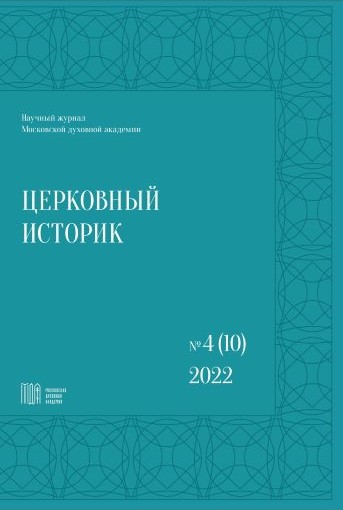On the Question of the Monastic Colonization of Kargopol
DOI:
https://doi.org/10.31802/CH.2022.10.4.006Keywords:
Russian North, monastic colonization, monastic culture of Kargopol, Kirillo-Chelmogorsky Monastery, Alexander-Oshevensky Monastery, ascetic problems, non-acquisitiveness as the main moral and religious problem of Novgorodians, ascetic paradigm of humility and obedienceAbstract
The monastic colonization of the Russian North, like the secular one, came from Novgorod and from the south, from the Rostov-Suzdal, later Moscow lands, and took on its features: a multi-ethnic character, the bidirectionality of colonization flows (from Novgorod and from the south, from Kyiv, Rostov-Suzdal, later the Moscow lands), involvement in the life of settlers and peasants, participation in the formation of Slavic and Finno-Ugric peoples into a single North Russian community. The main purpose of the study is to identify the specifics of the monastic way of life of the monasteries founded by both Novgorodians and representatives of the Nizov colonization using the example of the lives of the early founders of the monasteries of Kargopol (XIV–XV centuries). In the author's opinion, in this aspect, Kargopolye is a model territory, because it is believed that the boundary of the Novgorod and Nizov colonization passed along it, which, as the author revealed, was reflected in the ideological preferences of representatives of various colonization flows, imprinted, in particular, in the structure of temple dedications and revered holidays in the city of Kargopol. According to hagiographic literature, the directions of monastic aspirations and ascetic problems being solved by the founders of the Kargopol Kirillo-Chelmogorsk and Alexander-Oshevensk monasteries, founded by monks-students of the Novgorod and Moscow traditions, are traced. On the Kargopol material, it is confirmed that the Novgorod monastic tradition is based on extreme asceticism, hermitage, non-acquisitiveness; the fight against acquisitiveness is among the main moral and religious problems. The ascetics of the Moscow church tradition, with the ascetic spirit and strict prayerfulness, developed the ascetic paradigm of humility, obedience, overcoming pride and selfhood, which continued the Kyiv church ascetic experience developed by the school of St. Sergius.
Downloads
References
Бернштам Т. А. Роль верхневолжской колонизации в освоении Русского Севера (IX–XV вв.) // Фольклор и этнография Русского Севера. Л.: Наука, 1973. С. 5–29;
Бернштам Т. А. Народная культура Поморья. М.: ОГИ, 2009. С. 15–18.
Власова И. В. Этническая история и формирование населения Русского Севера // Русский Север: этническая история и народная культура. XII–XX века. М.: Наука, 2001. С. 21–24.
Дмитриева С. И. Очерк этнокультурной истории Архангельского Поморья // Мировоззрение и культура севернорусского населения. М.: Наука, 2006. С. 3–11. СПб.: Алетейя, 2018. С. 33–34, 47–57.
Докучаев-Басков К. А. История Челменской пустыни // Христианское чтение. СПб. 1889. Ч. 2. С. 227.
Житие Кирилла Челмогорского // Новый Олонецкий патерик. СПб.: Изд. «Дмитрий Буланин», 2013. С. 297.
Житие Лазаря Муромского // Новый Олонецкий патерик. С. 44.
Житие преподобного Кирилла Белозерского /подготовка текста Е. Г. Водолазкина, перевод и комментарии Е. Г. Водолазкина и Г. М. Прохорова. [Электронный ресурс] URL: https://kirillbelozersky.ru/zitie-kirilla-belozerskogo (дата обращения: 05.05.2022).
Житие преподобного Кирилла, игумена Челмогорского, Каргопольского чудотворца / Предисл., подгот. текста и коммент. А. Б. Мороза // Альфа и Омега. Ученые записки Об-ва для распространения Свящ. Писания в России. М., 1998. № 3 (17). С. 200–236.
Житие прп. Нила Столобенского // Ф. 304.I. Главное собрание библиотеки Троице-Сергиевой лавры. Минея Четья. № 672 (1621). Л. 86 об. — 108 об. [Электронный ресурс] URL: http://old.stsl.ru/manuscripts/book.php?col=1&manuscript=672 (дата обращения: 20.11.2016).
Кириченко О. В. Конвертация богатства в русской традиции // Идеалы и паллиативы в русской традиции и культуре / отв. ред. и сост. О. В. Кириченко. СПб.: Алетейя, 2018.
Кожевникова Ю. Н. Монастыри и монашество Олонецкой епархии во второй половине XVIII — начале XX в. Петрозаводск, 2009.
Лашук Л. П. Чудь историческая и чудь легендарная // Вопросы истории. 1969. № 10. С. 210–211;
Макаров Н. А. Русский Север: таинственное средневековье. М., 1993. С. 18–27, 163–164;
Макаров Н. А. Население Русского Севера в XI–XIII вв. М., 1990. С. 126.
Мелехова Г. Н., Носов В. В. Традиционный уклад Лекшмозерья. Ч. 2. М., 1994. С. 27–28, 121.
Мелехова Г. Н. К истокам города Каргополя: о чём говорят посвящения храмов и их размещение // Научный православный журнал «Традиции и современность». 2021. № 27. С. 39–49.
Мелехова Г. Н. Малые монастыри в культуре Русского Севера // Угрешский сборник. Сборник трудов преподавателей Николо-Угрешской православной духовной семинарии. Дзержинский: ООО «Издательство ПЕНАТЫ», 2011. С. 139–160.
Мелехова Г. Н., Фаркова Л. И. И был Господь убежищем гонимому… М. — Каргополь: Пенаты и книга, 2020.
Старицын А. Н., Пигин А. В. Источники по истории Наглимозерской пустыни Каргопольского уезда // Вестник церковной истории. 2010. № 3–4 (19–20). С. 147–168. Священник Лядинского Покровского храма Иоанн Венедиктов до 1652 г. проживал в Лекшмозерской (и Долгозерской) волости с женой, сыновьями, матерью и братом; в переписи 1648 г. значился как дьячок церкви Петра и Павла. 30 марта 1652 г. дьячок Иван был рукоположен во иерея и переведен в Покровскую церковь села Лядины.
Downloads
Published
How to Cite
Issue
Section
Categories
License

This work is licensed under a Creative Commons Attribution-ShareAlike 4.0 International License.







